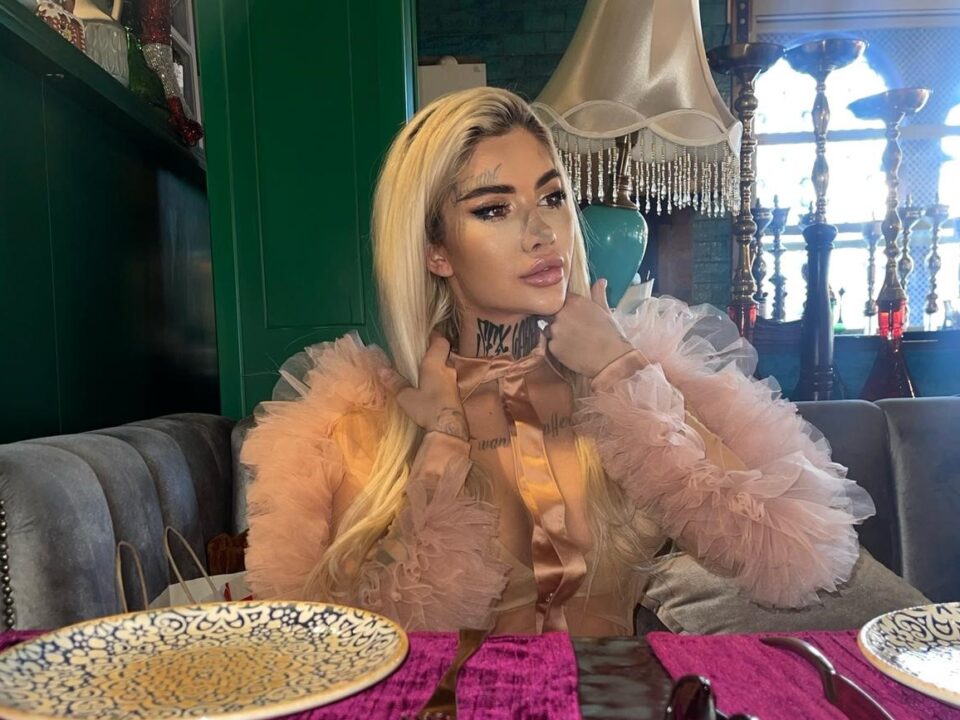Bia Khalifa is no stranger to controversy. The self-professed first OnlyFans model in Romania has been steadily building her notoriety over the past couple of years through numerous television appearances and her online activity.
“If you know someone who works on television or the media, they’ll know about me,” she says. “I catch attention because I’m different. I share my life and what’s on my mind online without fear. Full transparency.”
Bia Khalifa — also known by Bianca Niculai — is a part of the generation that grew up online. She had her first success on social media when TikTok was still Musical.ly, before coming to Romania at 15 years old, having been raised in Italy and Spain.
Since then, a lot has changed in her life. She moved countries, found success on Instagram, and started looking to other platforms as a creative outlet and source of income.
“I saw a girl from the United States who was putting herself through university by doing OnlyFans,” she recalls. “She seemed like such a cool person, and her story inspired me to start doing OnlyFans, too.”
While working on building her online presence on OnlyFans and Instagram and being featured on Romanian television, Bia also found the time to pursue her primary passion — singing and songwriting.
“I started making music three years ago, and I’ve been doing it for fun — as a hobby,” she explains. “I cover topics that are not ordinary in Romania, maybe even a little too extreme. Think Cardi B, Nicky Minaj, Saweetie.”
Songs such as “Donda,” “Uber,” and “Lu-K at Me” demonstrate her confidence, and forward lyricism as she raps over trap and hip-hop beats. Her music has a distinctly American flavor, with an occasional Balkan spiciness.
Her road to finding recognition as an artist, however, hasn’t been easy. Throughout her career as a media personality in Romania, Bia Khalifa has never shied away from taboo topics. She’s been a sex-positive member of the LGBTQ+ community who supports sex workers, all of which seem to go against the prevalent societal mores. She even has a tattoo on her neck that reads “Sex Worker.”
“I get a lot of hate when I talk about people’s rights, women’s rights, or because I’m bisexual,” she says. “The abuse thrown at me in the comments section is something else. People will say the meanest things trying to hurt you.”
Bia Khalifa is trying to build a media career in a country where, according to data from UN Women, women have lower access to financial support. They are more likely to experience food insecurity and spend a significant amount of time doing unpaid care work or domestic chores. Like the women she looks up to, Bia Khalifa’s presence challenges that status quo.
Fans have been recognizing her efforts, too. The one consolation she’s had during her struggles has been her fan base, which she says is more accepting and understanding of her issues. Bia Khalifa had to work with them to get there, but she didn’t mind doing the work.
“I’m not an overnight viral sensation. I work at it. I’m established,” she adds.
Bia Khalifa’s hard work also continues online — despite efforts from others to take her down. Over the past couple of years, she’s been a target of a concentrated effort to interfere with her online presence through hacking and profile hijacking on Instagram.
“My income is split between Instagram and OnlyFans, but everything depends on Instagram,” she says. “Everything is connected to it — my YouTube, my television career, my music, everything. People can see me on Instagram, tag me, and use my song in their stories.”
Over the past years, she says the situation has caused her to lose listeners, affecting her motivation to continue pursuing a career as an artist. She doesn’t have a business model for her music yet, meaning everything she releases is self-financed and independent. Without Instagram, her ability to sustain quality is severely impacted.
To make matters even worse, she doesn’t have a reliable way to defend herself and protect herself against future attacks.
“We don’t have laws [In Romania] to protect against cyberbullying and hacking,” Bia Khalifa says. “And the laws we do have are inefficient. The worst thing is people doing this are doing it for pleasure.”
Bia Khalifa is not the only media personality with a prominent online following facing these issues. So far, she’s managed to keep her chin up and confront them, biding her time to get back to working on what she loves – self-expression through photos, makeup, and music.
Still, she’s thinking a change of scenery – and musical style – might be in order.
“I’m thinking about moving to Spain and switching to reggaeton or trap,” she says, confident that some of her problems won’t follow her when she leaves the country.
